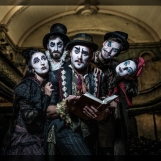History & Historiography, 2019
Full Name: Lucie Sutherland
Venue and Date: The Performance Lab, Sheffield Hallam University, Friday 17th May 2019
What were the main points that emerged from your interim event this year?
This was a day of discussion exploring the relationship between current research methodologies and tangible/intangible heritage in contemporary practice and performance historiography. The day was focused around a screened performance of The Machinery, and before this screening there was an introduction to and reflection upon development and reception of this production, from its creators. Caroline Radcliffe and Sarah Angliss have collaborated to create a contemporary, live performance of Pat Tracey’s original clog dance, (the steps for which Pat herself has traced back to pre-1820). The piece mixes dance steps with music and video to reflect the conditions of women’s repetitive labour and the human/automaton relationship created by the Industrial Revolution and described by Marx in Das Kapital (1867). Together, Radcliffe and Angliss filmed and recorded the working machinery at Quarry Bank cotton mill, juxtaposing clog dancing with the repetitious script of a contemporary call-centre and the overwhelming sounds of the cotton machines to create a performance that brings to the fore the intricate relationships between the industrial vernacular and technologies of the nineteenth and twenty-first centuries. After this introductory session and screening, and then initial responses from those in attendance, the lunch break was followed by short provocations from other interim participants. Specifically, Janice Norwood and Kate Dorney reflected upon their experience and understanding of the concept of intangible heritage. This was followed by a final, whole group discussion of the concept, and how engagement with The Machinery had prompted further reflection in relation to this subject.
- Radcliffe, C., & Angliss, S. (2012). Revolution: Challenging the automaton: Repetitive labour and dance in the industrial workspace. Performance Research, 17(6), 40–47.
- Taylor, D. (2016). Saving the “Live”? Re-performance and Intangible Cultural Heritage. Études Anglaises, 69(2), 149–161.
- Definitions of the intangible in relation to heritage will vary, and there will be varying cultural and ethical imperatives to take in to account with any given conceptual or material form of cultural heritage that is being presented through practice and/or examined by researchers.
- We returned frequently to the point that in researching and aiming to recuperate/preserve intangible heritage, the role and the presence of the audience (both historical and contemporary) is often neglected. This seems to be the case within, for example, the Taylor article, which we concluded is representative of a wider trend. This is something that deserves further critical attention.
- From the perspective of academic research, we discussed the competing demands of conducting research (including practice as research) that is of value for stakeholders in relation to intangible cultural heritage, while also meeting the requirements of research exercises and impact narratives. As the idea of the intangible makes immediately apparent, these two priorities for the academic may not align, and it is important to acknowledge this when engaging with research in this field.
Types of contributions (papers, performances, workshops, etc.)
As indicated above, the day consisted of a screened performance, an introductory talk from the creators of that performance, two short provocations, and whole group discussion.
Number of Delegates: 8 delegates (Please note our original numbers were considerably higher and closer to 15-20 but we had a number of apologies the night before/morning of the event).
How many were new to TaPRA? 3 new to TaPRA (2 x PG attendees, 1 x practitioner)
Did you have any non-UK participants? No
Any additional points or feedback not covered above?
This was a constructive day, engaging with a subject that was of direct relevance to the research practice of everyone in the room. We feel this was the beginning of a conversation about intangible heritage and methodologies that will feed in to future working group activities and practice. It is worth noting we were disappointed by the numbers in attendance, at one point numbers were higher but we had a significant number drop out at the last minute as the demands of assessment season set in. We will continue to explore best timing for interim events.
Overall budget awarded: £525.00
Amount spent: £430.80
Breakdown of costs:
Invited contributor – Sarah Angliss: £250.00 (to cover travel and a fee)
Invited contributor – Caroline Radcliffe: £76.00 (to cover costs of travelling by car from Birmingham to Sheffield: please note this replaces the anticipated costs of train travel, of £75)
https://www.birmingham.ac.uk/staff/profiles/drama/radcliffe-caroline.aspx
Refreshments:
Hayley Bradley
£50.50
(Sainsbury’s £11:45, Poundland £39.05)
PG Bursaries (Erin Lee)
One awarded in the end for train travel: £54.30

